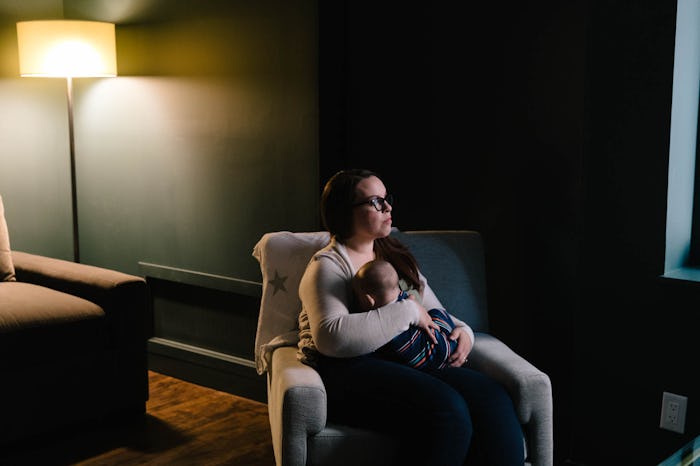Life
Here's What You Need To Know About How Breastfeeding Impacts The Baby Blues
Some of my most treasured memories with my daughter are those quiet moments I spent with her against my chest, breastfeeding and providing her with the nourishment she needed to grow. But in the midst of my struggle with postpartum depression, they sometimes also felt confusing. How can I be depressed when I have this beautiful face staring up at me? I soon learned that there are many ways to experience postpartum depression and/or the baby blues, and that my conflicting emotions weren't uncommon. But are the baby blues worse if you're breastfeeding? Can it exacerbate PPD?
"While some mothers may suffer from baby blues while breastfeeding, breastfeeding actually has the ability to help reduce baby blues," Melissa LaHann, lactation expert and inventor of the LatchPal Breastfeeding Clip, tells Romper in an email interview. "There are many physical and emotional benefits of breastfeeding: the skin-to-skin contact and hormone release associated with breastfeeding often increases feelings of attachment, closeness, and mothering. These feelings of attachment and closeness associated with breastfeeding have the ability to decrease feelings of sadness in nursing mothers."
LaHann also points out that, while breastfeeding doesn't prevent postpartum depression, studies do show that PPD and the baby blues may be less prevalent among breastfeeding mothers. One such study in 2012 found that women who breastfeed their infants reduced their risk of developing PPD, with effects being maintained over the first four months of the postpartum period.
Leigh Anne O’Connor, International Board Certified Lactation Consultant (IBCLC) and parenting coach, explains to Romper that, while the baby blues is common for both breastfeeding and non-breastfeeding moms, the rise and fall of hormones — including those related to producing breast milk — in the postpartum state can "have a big impact on new moms."
"It is more of a cascade effect of how things pan out with the care a person receives in pregnancy, labor, birth, and postpartum," O'Connor says of women who may be experiencing baby blues or postpartum depression while breastfeeding. For example, difficulties with breastfeeding paired with feelings of disappointment can have an impact on a mother's mental health, O'Connor says.
Candy Campbell, a registered labor and delivery nurse and assistant professor in the nursing department at the University of San Francisco, agrees, adding that a breastfeeding mom who is experiencing baby blues or postpartum depression may also be physically and mentally exhausted, or lacking in support from her partner and/or family and friends. "As such, it may have little to do with breastfeeding," she tells Romper in an email interview.
Mark Henick, a mental health consultant in Toronto, says that while breastfeeding is often seen as one of the most intimate connections between mother and baby, some of the symptoms associated with the baby blues or PPD may cause a new mother to interpret the experience differently.
"For example, that connection that breastfeeding provides, which can counteract the feelings of loneliness, isolation, and unimportance, may not actually be expedited because the cognitive distortions are louder," he tells Romper. "I call them the lies that depression tells you. Sometimes depression lies in whispers, sometimes it screams so loud you can't hear anything else."
Of course, like O'Connor, Henick points out that mothers who experience a tough time breastfeeding or simply do not find it enjoyable may be mentally affected by the experience.
"Since in many circles breastfeeding has become what 'good' parents are supposed to always do, moms might feel like a failure if they can't," he says. "She may feel shame and it may further compound her feelings of isolation and inadequacy. This is despite the fact that not everyone can breastfeed, for a variety of reasons."
Henick points out that when what was initially labeled as the baby blues becomes PPD, it needs to be addressed with a healthcare professional. While about 70 to 80 percent of new moms are affected by the baby blues, only 10 to 20 percent suffer from PPD, which lasts longer than a few weeks and is accompanied by much more intense emotions, according to Fit Pregnancy.
"One of the leading causes of death among new mothers is suicide," Henick says. "By some estimates, more than 90 percent of people who die by suicide have a diagnosable mental illness at the time of their death. However, PPD and all forms of depression are treatable, and recovery is expected and likely when people get the help they need." Henick says PPD is most effectively treated with a combination of psychotherapy, medication, and/or social supports.
My non-medical opinion? Don't let anyone tell you that breastfeeding or the postpartum experience is "supposed to" look a certain way. Take it from a mama who breastfed her daughter and also had PPD — if you are suffering, then you are not alone in the least. Finding the help you need, whether it's with a lactation consultant, your doctor, or a mental health professional is not only a necessity, but it is often the beacon of hope you've been waiting for.
Check out Romper's new video series, Romper's Doula Diaries:
Check out the entire Romper's Doula Diaries series and other videos on Facebook and the Bustle app across Apple TV, Roku, and Amazon Fire TV.
